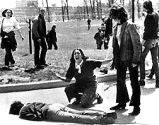Wednesday, March 30, 2005
Krugman is still mad (and I don't mean angry).
As Paul Krugman in his latest column warns us all to beware the tide of extremist right-wing Christian political assassins rising among us (even if they are not assassinating anybody)...
 Well, he's surely right about that. It's not the same country today as during the Nixon era, who could argue? There's no Spiro Agnew smoothing troubled waters, no race riots burning down inner cities, no SDS and Weathermen bombings, no anti-war protestors closing universities, no Kent State Massacres with the National Guard shooting down students on campus ...
Well, he's surely right about that. It's not the same country today as during the Nixon era, who could argue? There's no Spiro Agnew smoothing troubled waters, no race riots burning down inner cities, no SDS and Weathermen bombings, no anti-war protestors closing universities, no Kent State Massacres with the National Guard shooting down students on campus ...
Nope, things are more dangerous today, because there's a conspiracy afoot, as he told the New Yorker, while he was promoting his book...
So we have a conspiracy out in the open, empowering a rising tide of right-wing assassins who don't kill anyone, in a society that's todaymore less polarized on major issues than at any time since before LBJ was president.
Could the last fact, combined with the frustration of electoral defeat, be really what's driving Krugman mad?
(Or maybe it's just that the polarization theme sells, so pushing it is good business that "creates a publishing opportunity" for the man?
Not that he'd purposely sell his integrity with bogus laments over the loss of the social cohesion of the good old days of Nixon, or with bogus warnings about conspiracies being conducted out in the open, just to promote the sales of a book. How could one pretend to believe such things with a straight face?
But if one wanted to genuinely believe such nonsense, what better motivators are there than acclaim from the choir, reinforced self-righteousness, and good money? Madness perhaps can be adaptive, and profitable too.)
As Paul Krugman in his latest column warns us all to beware the tide of extremist right-wing Christian political assassins rising among us (even if they are not assassinating anybody)...
America isn't yet a place where liberal politicians, and even conservatives who aren't sufficiently hard-line, fear assassination. But unless moderates take a stand against the growing power of domestic extremists, it can happen here.... it's worth remembering what he considers to be the good old days of a healthy social climate in American politics. As he told CalPundit, while he was promoting his book...
"Is this the same country that we had in 1970? I think we have a much more polarized political system, a much more polarized social climate ...we're probably not the country of Richard Nixon ..."
 Well, he's surely right about that. It's not the same country today as during the Nixon era, who could argue? There's no Spiro Agnew smoothing troubled waters, no race riots burning down inner cities, no SDS and Weathermen bombings, no anti-war protestors closing universities, no Kent State Massacres with the National Guard shooting down students on campus ...
Well, he's surely right about that. It's not the same country today as during the Nixon era, who could argue? There's no Spiro Agnew smoothing troubled waters, no race riots burning down inner cities, no SDS and Weathermen bombings, no anti-war protestors closing universities, no Kent State Massacres with the National Guard shooting down students on campus ...Nope, things are more dangerous today, because there's a conspiracy afoot, as he told the New Yorker, while he was promoting his book...
"This is hard for journalists to deal with. They donít want to sound like crazy conspiracy theorists. But thereís nothing crazy about ferreting out the real goals of the right wing; on the contrary, itís unrealistic to pretend that there isnít a sort of conspiracy here, albeit one whose organization and goals are pretty much out in the open."... in fact, the very worst kind of conspiracy -- one that's out in the open!
So we have a conspiracy out in the open, empowering a rising tide of right-wing assassins who don't kill anyone, in a society that's today
Could the last fact, combined with the frustration of electoral defeat, be really what's driving Krugman mad?
(Or maybe it's just that the polarization theme sells, so pushing it is good business that "creates a publishing opportunity" for the man?
Not that he'd purposely sell his integrity with bogus laments over the loss of the social cohesion of the good old days of Nixon, or with bogus warnings about conspiracies being conducted out in the open, just to promote the sales of a book. How could one pretend to believe such things with a straight face?
But if one wanted to genuinely believe such nonsense, what better motivators are there than acclaim from the choir, reinforced self-righteousness, and good money? Madness perhaps can be adaptive, and profitable too.)
